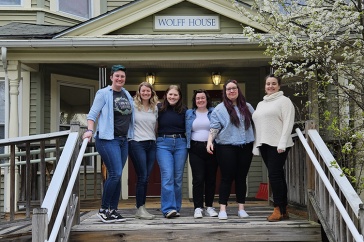
After her 21st birthday party — what should have been one of the happiest moments of her life — Ericka Murria was raped by a friend of her boyfriend’s.
As soon as she got home, Ericka called an ambulance and had a rape kit done — a process that can be humiliating and invasive for survivors but can also be incredibly helpful in identifying suspects, solving crimes and preventing future assaults. Ericka’s father was waiting for her at the other side of the door.
She distinctly remembers an officer’s response when her father asked how long it would take for her rape kit to be analyzed. “He said, ‘I’m just going to be honest. Nothing’s going to happen,’” Ericka remembers.
And he was right. For more than a decade, Ericka’s rape kit — DNA evidence of the crime — went untouched.
Ericka’s is not a rare case. It’s only one story of many that take center stage in “I Am Evidence,” HBO’s 2018 documentary about the hundreds of thousands of rape kits that sit untested in police departments or storage facilities around the country in what is known as the rape kit backlog. The film follows four survivors whose rape kits went untested for years as they navigate the justice system that so often fails them.
We like to believe that crime shows like "Law & Order SVU" are real life: After an assault, the survivor does a rape kit, detectives test the DNA and the rapist is arrested, convicted of their crimes and sent to prison. But the reality lines up much more closely with our understanding of rape culture. Instead of survivors making their way through the justice system, it turns its back on them, and their untested rape kits sit on shelves, overflowing from storage in police stations into abandoned city warehouses, doomed to wait in line behind the thousands in front of them, or not to be tested at all.

Officials on the law enforcement end in “I Am Evidence” say that part of the reason the backlog exists and is growing is due to lack of funding and resources to test all of the kits and track down the perpetrators. But let’s remember the real reason the backlog exists in the first place: the fact the rape culture in which we live does not allow rape to be taken as seriously as other crimes. It’s culture of not believing survivors, blaming them for what happened to them and literally putting their cases on the shelf.
In “I Am Evidence,” Rebecca Campbell, a professor of psychology at Michigan State University, discusses what she saw when she looked at police reports of sexual assaults. “It’s pretty clear they did not believe the victims," she says. "They fundamentally did not believe what happened to them was a crime, did not believe what happened to them merited their attention. We read police reports where victims were called bitches, hoes, whores, heifers.”
It’s impossible to know how many rape kits are still sitting in storage facilities waiting to be tested because most jurisdictions don’t keep track and there is no federal law mandating or tracking the testing of rape kits, but the numbers estimated to be more than 200,000 and counting, with many that go back decades.
But things are changing. Across the country, states are beginning to chip away at the backlog and test the untested rape kits; some states are even making real reforms, including our state of New Hampshire.
Early this month, our congressional representatives announced $650,261 in grants from the National Institute of Justice to support survivors of sexual assault, specifically toward ending the rape kit backlog. About half of the funds will benefit the reduction of sexual assault and rape kit backlogs, and the other half will help initiate a tracking program for sexual assault kits. It’s a big step for New Hampshire, a state where we have no idea how many untested rape kits there are because there is no tracking system.
Although Ericka Murria’s rape kit was eventually tested more than a decade after her assault and a DNA match was found, it didn’t mean there would be a conviction. Her perpetrator was found not guilty for his crimes. Even though the evidence was there, and after years, Ericka finally had proof, it wasn’t enough. But she also proves that there is life after trauma, even after the justice system turns its back on you.

“I am evidence that there is more to that box. There is a human being there. It is not just a kit. This is a person,” Ericka says.
Join SHARPP for a free community screening of “I Am Evidence” on Tuesday, Oct. 23, at 6:30 p.m. in McConnell 240, followed by a panel discussion forum. Trained SHARPP peer advocates will be present at the event.
Read more blog entries like this at the SHARPP Edge.
-
Written By:
Jordyn Haime '20 | SHARPP Student Marketing and Communications Assistant














































